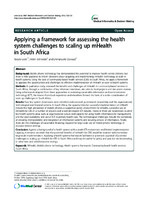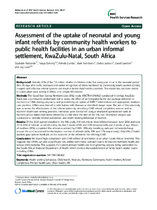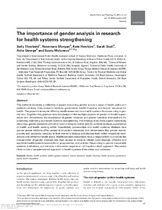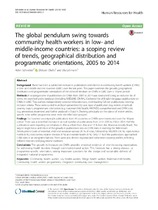Applying a framework for assessing the health system challenges to scaling up mHealth in South Africa

View/
Date
2012Author
Leon, Natalie
Schneider, Helen
Daviaud, Emmanuelle
Metadata
Show full item recordAbstract
Background: Mobile phone technology has demonstrated the potential to improve health service delivery, but
there is little guidance to inform decisions about acquiring and implementing mHealth technology at scale in
health systems. Using the case of community-based health services (CBS) in South Africa, we apply a framework
to appraise the opportunities and challenges to effective implementation of mHealth at scale in health systems.
Methods: A qualitative study reviewed the benefits and challenges of mHealth in community-based services in
South Africa, through a combination of key informant interviews, site visits to local projects and document reviews.
Using a framework adapted from three approaches to reviewing sustainable information and communication
technology (ICT), the lessons from local experience and elsewhere formed the basis of a wider consideration of
scale up challenges in South Africa.
Results: Four key system dimensions were identified and assessed: government stewardship and the organisational,
technological and financial systems. In South Africa, the opportunities for successful implementation of mHealth
include the high prevalence of mobile phones, a supportive policy environment for eHealth, successful use of
mHealth for CBS in a number of projects and a well-developed ICT industry. However there are weaknesses in other
key health systems areas such as organisational culture and capacity for using health information for management,
and the poor availability and use of ICT in primary health care. The technological challenges include the complexity
of ensuring interoperability and integration of information systems and securing privacy of information. Finally,
there are the challenges of sustainable financing required for large scale use of mobile phone technology in
resource limited settings.
Conclusion: Against a background of a health system with a weak ICT environment and limited implementation
capacity, it remains uncertain that the potential benefits of mHealth for CBS would be retained with immediate
large-scale implementation. Applying a health systems framework facilitated a systematic appraisal of potential
challenges to scaling up mHealth for CBS in South Africa and may be useful for policy and practice decision-making
in other low- and middle-income settings.
Collections
Related items
Showing items related by title, author, creator and subject.
-
Assessment of the uptake of neonatal and young infant referrals by community health workers to public health facilities in an urban informal settlement, KwaZulu-Natal, South Africa
Nsibande, Duduzile; Doherty, Tanya; Ijumba, Petrida; Tomlinson, Mark; Jackson, Debra; Sanders, David; Lawn, Joy (Biomed CentralBiomed Central, 2013)Background: Globally, 40% of the 7.6 million deaths of children under five every year occur in the neonatal period (first 28 days after birth). Increased and earlier recognition of illness facilitated by community health ... -
The importance of gender analysis in research for health systems strengthening
Theobald, Sally; Morgan, Rosemary; Hawkins, Kate; Ssali, Sarah; George, Asha S.; Molyneux, Sassy (Oxford University Press, 2017)This editorial discusses a collection of papers examining gender across a range of health policy and systems contexts, from access to services, governance, health financing, and human resources for health. The papers ... -
The global pendulum swing towards community health workers in low- and middle-income countries: A scoping review of trends, geographical distribution and programmatic orientations, 2005 to 2014
Schneider, Helen; Okello, Dickson; Lehmann, Uta (BioMed Central, 2016)BACKGROUND: There has been a substantial increase in publications and interest in community health workers (CHWs) in low- and middle-income countries (LMIC) over the last years. This paper examines the growth, geographical ...



